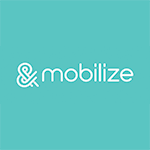Description

Mobilize

eDirectory

Eventcube
Comprehensive Overview: Mobilize vs eDirectory vs Eventcube
Sure, let's delve into an overview of Mobilize, eDirectory, and Eventcube, focusing on their primary functions, target markets, market share, user base, and key differentiators.
Mobilize
a) Primary Functions and Target Markets
Primary Functions: Mobilize is a community engagement platform designed to help organizations build, manage, and engage large member networks. It offers tools for communication, event management, analytics, and community building. Features include member management, group discussions, messaging, and event coordination.
Target Markets: Mobilize primarily targets professional associations, alumni networks, non-profit organizations, advocacy groups, and any community-focused organization that requires a robust member engagement solution.
b) Market Share and User Base
Mobilize is a niche player in the community engagement space, focusing primarily on organizations looking for a tailored solution to manage both large and small community groups. Its user base includes a variety of non-profits, businesses, and educational institutions, but specific market share data can be difficult to pinpoint due to the plethora of engagement tools available.
c) Key Differentiating Factors
- Community-Centric Features: Unlike many general CRM tools, Mobilize is designed specifically for community engagement, offering tools tailored for managing and communicating with members.
- Ease of Use: It emphasizes user experience with intuitive design and easy setup.
- Robust Engagement Tools: Includes unique features like leaderboards, forums, and event functionalities catered towards community growth.
eDirectory
a) Primary Functions and Target Markets
Primary Functions: eDirectory is a robust online directory software platform that enables users to create directory-driven websites. This includes business directories, membership directories, and local guides. It offers features like customizable themes, SEO tools, payment processing, and listing management.
Target Markets: Target markets for eDirectory include business organizations, chambers of commerce, local guide websites, real estate directories, and industry-driven directories.
b) Market Share and User Base
eDirectory holds a significant position in the niche market of online directories. Although it might not compete with massive website platforms, it is preferred in its niche for those needing a dedicated directory platform. Its user base ranges from small businesses to larger enterprises seeking customized directory solutions.
c) Key Differentiating Factors
- Focus on Directories: Unlike broader CMS platforms, eDirectory specializes in directory functionalities.
- Customization and Scalability: Offers extensive customization options and scalability for growing business needs.
- SEO and Monetization Tools: Built-in SEO features and multiple monetization options like AdSense, featured listings, and membership fees.
Eventcube
a) Primary Functions and Target Markets
Primary Functions: Eventcube is an advanced online event ticketing, membership, and virtual events platform. It provides features for ticket sales, live streaming, membership management, and virtual event hosting. Eventcube aims to support seamless event experiences both online and offline.
Target Markets: It targets event organizers, businesses hosting virtual events, music venues, festival organizers, and any organization needing comprehensive event management solutions.
b) Market Share and User Base
Eventcube is one of many competitors in the online event and ticketing sector, alongside giants like Eventbrite and Ticketmaster. It has carved out a niche by offering more control over branding and pricing. Its user base includes concert promoters, corporate event planners, and community organizers looking for flexible event solutions.
c) Key Differentiating Factors
- Brand Control and Customization: Unlike larger competitors, Eventcube offers extensive branding and pricing flexibility, allowing clients to have more control over ticket sales.
- Integrated Virtual Events Platform: Provides a comprehensive solution for virtual events, including streaming and interactive attendee engagement tools.
- Focus on Community and Memberships: Also provides membership management solutions, integrating community and event functions.
Comparative Overview
- Target Market Focus: Mobilize is centered on community engagement, eDirectory on directory-based websites, and Eventcube on event management and virtual experiences.
- Customization: eDirectory and Eventcube provide higher degrees of customization tailored towards their specific functions (directories and events, respectively), while Mobilize offers a streamlined approach for ease of use in community engagement.
- Market Niche: Each serves a distinct niche, making direct market share comparisons challenging. Mobilize focuses on engagement, eDirectory on directories, and Eventcube on event solutions.
Each platform, while offering some overlapping functionalities, serves unique market needs with distinct features that set them apart in their respective fields.
Contact Info

Year founded :
2017
Not Available
Not Available
United States
Not Available

Year founded :
Not Available
Not Available
Not Available
Not Available
Not Available

Year founded :
2013
+44 77 1022 7278
Not Available
United Kingdom
http://www.linkedin.com/company/eventcube-solutions
Feature Similarity Breakdown: Mobilize, eDirectory, Eventcube
When comparing Mobilize, eDirectory, and Eventcube, these platforms serve different primary functions but share some common features, particularly in community building, directory management, and event organization. Here's a breakdown of their similarities and differences:
a) Core Features in Common
-
Community/Member Management:
- All platforms provide tools to manage and engage communities or members, allowing administrators to maintain detailed profiles and organize user information.
-
Communication Tools:
- Each platform offers various communication tools, such as messaging or email capabilities, to facilitate interactions among members or participants.
-
Event Management:
- Basic event creation and management features are typically available, allowing users to organize activities and track participation.
-
Customizable User Profiles:
- Users can create and update their profiles, providing personal information and preferences.
-
Analytics and Reporting:
- Tools to measure engagement, track activities, and generate reports to understand community or event dynamics better.
b) User Interface Comparison
-
Mobilize:
- Known for its clean, intuitive interface that is optimized for community engagement, focusing on simplicity, and ease of use. It often integrates social media-like elements, making navigation familiar and straightforward.
-
eDirectory:
- Offers a robust but slightly more complex interface due to its focus on directory services. It often includes extensive customizability options for directory layouts and styles, catering to businesses that require detailed directory listings.
-
Eventcube:
- Primarily centered around events, it boasts an interface that focuses heavily on event creation, ticket sales, and attendee management. The design is typically user-friendly, with clear pathways for both organizers and attendees.
c) Unique Features
-
Mobilize:
- Often emphasizes collaboration with features like discussion boards and forums, allowing for dynamic member engagement. It also frequently integrates with external tools like Slack and Zoom, providing added versatility in communication.
-
eDirectory:
- Distinguished by its focus on comprehensive directory management, including advanced features like multi-tier directories, monetization options (e.g., subscriptions, advertising), and SEO-friendly content management.
-
Eventcube:
- Sets itself apart with in-depth features related to event monetization, such as customizable ticketing options, virtual event hosting, and integration with payment gateways. It also often offers tools specifically tailored for virtual and hybrid events, which can include live streaming capabilities and interactive features for attendees.
Each product appeals to different primary user needs—community interaction for Mobilize, directory management for eDirectory, and event coordination for Eventcube—while sharing overlapping functions that cater to managing groups and interactions.
Features

Not Available

Not Available

Not Available
Best Fit Use Cases: Mobilize, eDirectory, Eventcube
Sure, let's explore the best fit use cases for Mobilize, eDirectory, and Eventcube, addressing each of your questions:
a) Mobilize
Mobilize is a community management platform designed to help organizations build and manage active and engaged communities.
-
Best Fit Use Cases:
- Associations and Non-Profits: Organizations that thrive on active member participation and need tools for communication, collaboration, and event management.
- Professional Groups: Industries like law, medicine, or tech, where networking and staying updated on industry trends are crucial.
- Educational Institutions: Alumni networks and student organizations for managing events and maintaining engagement post-graduation.
- Large-Scale Online Communities: Brands and businesses looking to foster user-generated content and build a loyal customer base.
-
Industry Verticals/Company Sizes:
- SMEs to Large Enterprises: As it scales well from smaller groups to larger communities.
- Tech-Driven Industries: Where community feedback and iteration speed are essential for development and support.
b) eDirectory
eDirectory is a directory software platform for building and managing online directories and databases.
-
Preferred Scenarios:
- Business Directories: For chambers of commerce, city guides, or specialized industry directories (e.g., medical, legal).
- Niche Marketplaces: Where organizations want to curate lists of providers, freelancers, or suppliers for a particular area or industry.
- Associations and Guilds: For managing membership lists, credentialing, and offering member-only access to resources.
- Content-Based Revenue Models: Companies looking to monetize listings via subscriptions, tiered access, or ad spaces.
-
Industry Verticals/Company Sizes:
- Small to Medium Enterprises: Particularly those in tourism, real estate, or professional services.
- Media and Publishing Companies: That want to offer directory listings as part of their content offerings.
c) Eventcube
Eventcube is an event management and ticketing platform, aimed at providing customizable event solutions.
-
Best Situations for Use:
- Event Organizers and Promoters: Who need flexible and robust ticketing options beyond standard offerings like Eventbrite.
- Music and Entertainment Venues: Where custom branding, audience insights, and direct sales are critical.
- Corporate and Private Events: That require specific ticketing features such as tiered access and detailed reporting.
- Sports Organizations: that need to manage season tickets, matchday sales, and fan engagement.
-
Industry Verticals/Company Sizes:
- Small Independent Venues to Large-Sized Enterprises: Especially those needing high customization in their ticketing systems.
- Event Production Companies: Benefiting from managing everything from registrations to payments and on-site entries.
d) Industry Verticals/Company Sizes
-
Mobilize: Best suits industries heavily reliant on community engagement and feedback. Large-scale tech firms or associations with significant membership bases can extract a lot of value.
-
eDirectory: Ideal for businesses that prioritize organized listing and discovery, across sectors like real estate, tourism, or professional services. It serves both local businesses and broader, sometimes more niche, markets efficiently.
-
Eventcube: Tailored for the entertainment, sports, and event management industries where robust ticketing and attendee management is a priority. It scales from small concert halls to large event venues requiring complex ticketing solutions.
Each of these tools is suited to specific project goals and industries, so choosing the right one depends on the core focus of the business or project.
Pricing

Pricing Not Available

Pricing Not Available

Pricing Not Available
Metrics History
Metrics History
Comparing teamSize across companies
Conclusion & Final Verdict: Mobilize vs eDirectory vs Eventcube
When evaluating Mobilize, eDirectory, and Eventcube, it's essential to consider factors such as features, pricing, scalability, user-friendliness, and specific use-case needs. Here's a breakdown and final verdict for each:
a) Best Overall Value
Determining the product that offers the best overall value depends on the specific needs of the user or organization:
- Mobilize offers excellent value for community building and management, particularly for organizations that need tools tailored for engagement, communication, and event hosting.
- eDirectory provides the best value for creating and managing online directories, with robust tools for directory listings, monetization, and SEO capabilities.
- Eventcube excels in value for event management, particularly in customization and integration options for event ticketing and virtual event platforms.
Overall, if community management is the primary need, Mobilize offers the best value. For directory management, eDirectory is superior, and for event-specific requirements, Eventcube is the standout.
b) Pros and Cons
Mobilize
Pros:
- Strong community management tools focused on engagement.
- Comprehensive communication options including email, chat, and forums.
- User-friendly interface that facilitates member interactions effectively.
Cons:
- May have limited integration options compared to more specialized platforms.
- Pricing can escalate with larger communities.
eDirectory
Pros:
- Highly customizable directory platform with powerful SEO tools.
- Strong monetization options through membership and advertisement features.
- Comprehensive data management tools for directory listings.
Cons:
- May require a steeper learning curve to fully utilize its advanced features.
- Can be overkill for small or simple directory needs.
Eventcube
Pros:
- Excellent customization features for ticketing and event management.
- Supports virtual and physical events with various integration options.
- Strong analytics and reporting tools for events.
Cons:
- Primarily focused on event management, which may not fulfill other community-building needs.
- Costs can increase with event size and features required.
c) Specific Recommendations
-
For Users Focused on Community Engagement: Choose Mobilize if your primary need revolves around building and managing a thriving community with diverse communication tools.
-
For Users Focused on Directory Management: eDirectory is the best option if creating a feature-rich online directory with strong SEO and monetization capabilities is your goal.
-
For Event-Focused Organizations: Eventcube should be your pick if managing events, either online or offline, is the core requirement, offering extensive customization and analytics.
When deciding, consider a trial period or demo of each product to understand better how it fits your specific business processes and user experience requirements. Each platform's value is best realized in the context of its intended purpose, so aligning product strengths with organizational needs is key.